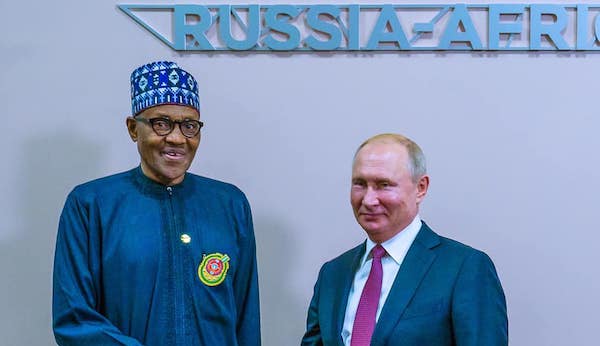News
Buhari’s Russia trip, another diplomatic formality or a real promise? Here are 10 takeaways

President Muhammadu Buhari has just returned to Abuja after a four-day official trip to Russia where he attended an African summit put together by the Russian Government.
Though there had been talks about the president’s constant travels abroad, with many Nigerians asking him to concentrate more on the many challenges facing the country, Ripples Nigeria highlights some of the outcomes of the trip and why they matter to Nigeria and its economy.
Here are the 10 takeaways from President Buhari’s Russian trip:
1. One of the takeaways was the decision by the Russians to agree to a government-to-government understanding that would see them return to complete the Ajaokuta Steel Rolling Mill and commission it.
It is instructive to note that Nigeria had reportedly expended well over USD 5 billion without it coming to fruition. The completion of the now problematic Ajaokuta Steel Complex, no doubt, holds a key to industrial revolution in the country.
2. President Buhari was able to get his Russian counterpart, Vladimir Putin, to agree to a new chapter in the relationship between the two countries, which will see to expansion in cooperation as it relates to the energy sector, petroleum and gas, trade and investment, defence and security, mining and steel development, aluminium and phosphate, education and agriculture.
3. President Putin, during the trip also assured that Russian companies were ready to offer their scientific and technological developments to their African partners, and share their experience of upgrading energy, transport and communications infrastructure.
READ ALSO: 2023 PRESIDENCY: Ohanaeze youths ask Igbo govs, senators to join APC
4. President Buhari and his delegation were also able to get the commitment of one of Russia’s leading rail line service providers, MEDPROM to undertake the 1,400-kilometer Lagos-Calabar rail track.
The rail track will pass through all the states in the South-South sub-region.
The development queries the status of the existing agreement between the Nigerian government and a Chinese firm, China Railway Construction Corporation (CRCC) for construction of the same Lagos to Calabar rail line.
Emerging reports earlier in the week had expressed concerns that the Chinese company may have failed to mobilize required funds, thereby casting doubts on its capacity and capability to undertake the capital-intensive project.
Reports had also quoted an American firm, Ameri Metro Incorporation, during an official visit to the Minister of Transport, Rotimi Amaechi, as proposing to undertake and fund the same project from scratch to finish.
The meeting was silent on what the government position was, raising concerns that the Lagos-Calabar rail project may have hit a rough patch. The Lagos-Ibadan rail project being handled by a Chinese firm is, however, on track.
5. The president’s delegation also signed the agreement and MoU between the NNPC and Russia’s Lukoil.
The two oil companies are expected to upgrade their commercial relationship to a government-to-government backed partnership, to work together in upstream operations and in revamping Nigeria’s ill-functioning refineries.
6. Of importance also is the signing of the MoU resolving past issues, paving the way for the revival of the rested joint venture between the NNPC and Russia’s gas giant, GASPROM for the development of Nigeria’s enormous gas resources and its infrastructure.
7. The president also got a deal for the technological upgrade and timely delivery of the balance of seven, out of an existing order for 12 Attack Helicopters.
8. The lapsed Nigeria-Russia Military Technical Agreement is also to be renewed, with President Buhari promising that it would be concluded as soon as possible. Russia had been ready with her part.
With the renewal of this pact, the procurement of military hardware will be on a government-to-government basis, eliminating middlemen and reducing cost, as well as the training of military personnel, modernization of the armed forces, refurbishment and renewal of infrastructure and equipment.
9. The Russian Federation also agreed to award more scholarships to Nigerian students to study in various fields in the country.
10. Russia also agreed to support Nigeria in laying a solid foundation for food security. This will partly come through raw materials (phosphate) supply for the country’s fertilizer initiative.
This is capable of reopening dozens of blending plants and the return to work of thousands of employees.
Join the conversation
Support Ripples Nigeria, hold up solutions journalism
Balanced, fearless journalism driven by data comes at huge financial costs.
As a media platform, we hold leadership accountable and will not trade the right to press freedom and free speech for a piece of cake.
If you like what we do, and are ready to uphold solutions journalism, kindly donate to the Ripples Nigeria cause.
Your support would help to ensure that citizens and institutions continue to have free access to credible and reliable information for societal development.




















